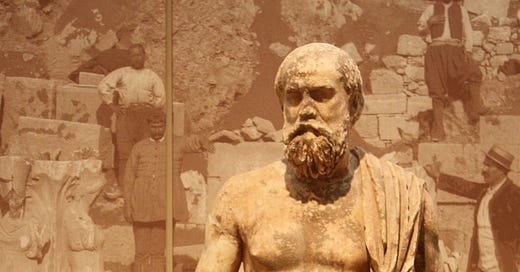TheGentleLaw Community
Plutarch (c. 46–after 119 CE) stands as one of the most beloved thinkers of antiquity, best known for his Parallel Lives, biographies that explored the moral character of famous Greeks and Romans, and his Moralia, a rich collection of essays and dialogues on ethics, religion, politics, and everyday life. Living during the early Roman Empire but deeply rooted in Greek culture, Plutarch combined a profound sense of moral duty with an extraordinary gentleness that extended beyond human beings — reaching the animal world as well.
Though Plutarch’s fame today rests mainly on his historical works, it is his reflections on animals that offer a strikingly modern, compassionate philosophy, one that invites surprising parallels with Buddhist thought.
A Life Shaped by Ethical Inquiry
Born in the small town of Chaeronea in central Greece, Plutarch lived through a period of Roman dominance but remained proudly Greek. He traveled widely, studied at Athens, and later became a priest at the temple of Apollo at Delphi. Plutarch’s philosophy was shaped by a synthesis of Platonic idealism and a pragmatic, down-to-earth moralism.
Throughout his writings, Plutarch urges human beings to cultivate virtue, wisdom, and self-restraint, not merely for personal success, but for the sake of creating harmony within oneself and with the larger world. His ethical concerns naturally extended to animals, which he believed were not mindless creatures but sentient beings capable of reason, emotion, and friendship.
Plutarch’s Philosophy on Animals
Plutarch’s essay On the Eating of Flesh (De Esu Carnium) is one of the earliest surviving arguments against eating meat. In it, he condemns the killing of animals for food not only as unnecessary but as a barbaric practice that brutalizes the human soul:
"You ask me why Pythagoras abstained from eating flesh. For my part, I rather wonder both by what accident and in what state of soul or mind the first man did so, touched his mouth to gore and brought his lips to the flesh of a dead creature."
(De Esu Carnium, I.2)
For Plutarch, the consumption of animal flesh marks a rupture with the natural gentleness inherent to human beings. He portrays meat-eating as a learned corruption, not an innate need. Human beings, he argues, are naturally inclined toward compassion, and to hurt animals is to destroy something fundamental within ourselves.
Keep reading with a 7-day free trial
Subscribe to The Gentle Law to keep reading this post and get 7 days of free access to the full post archives.





